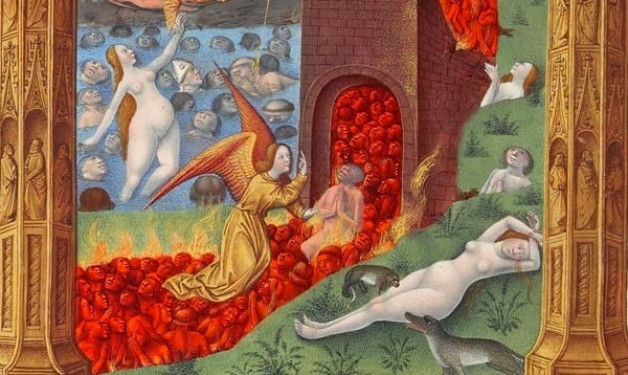Imagine there’s no Heaven
It’s easy if you try
No Hell below us
Above us only sky
Imagine all the people living for todayImagine there’s no countries
It isn’t hard to do
Nothing to kill or die for
And no religion too
Imagine all the people living life in peace
These first two verses of John Lennon’s “Imagine” invite us into a utopian paradise where the elimination of religion and politics—the two things men seem to fight about most—has finally ended all competition and dissension on earth. Once government and religion are removed from the equation, Lennon seems to suggest, peace and love are all that will remain. Of course, this imagined utopia is an implicit denial that God is the true source of all peace and love. Lennon fails to see that, in a world without God, the life of man is meaningless; he is not lovable in himself, but only because he is created and loved by God.
Far from depicting a heavenly utopia, Lennon’s song is actually closer to a description of Purgatory, the place of purification after death. Purgatory is neither Hell nor Heaven, and as in Lennon’s utopia, there are no countries, no killing, and no dying there. The souls in Purgatory are even all living for the eternal “today” of everlasting life and peace in the presence of God. That may be the end of the similarity, yet much more can be said about Purgatory, which has fascinated the Christian imagination for centuries, even millennia.
Scripture tells us little about Purgatory aside from a few key references to its existence. Even the Catechism devotes only three paragraphs to the topic. The most imaginative description we have of Purgatory is probably that made by Dante Alighieri in his Purgatorio, the second “volume” of his trilogy, La Divina Commedia. While Dante’s depiction of Purgatory is not a doctrinal statement, it can help the doctrine of Purgatory come alive for us and spur us on to pray for our deceased loved ones. Before glancing at Dante’s text, it is worth noting the most substantial paragraph on Purgatory from the Catechism:
The Church gives the name Purgatory to this final purification of the elect, which is entirely different from the punishment of the damned. The Church formulated her doctrine of faith on Purgatory especially at the Councils of Florence and Trent . . . As for certain lesser faults, we must believe that, before the Final Judgment, there is a purifying fire . . . we understand that certain offenses can be forgiven in this age, but certain others in the age to come. (CCC 1031)
With the doctrine of the Church in mind, we can take a glance at Dante’s imaginative Purgatory. After escaping Hell, Dante and his companion Virgil arrive on the shore of “ante-Purgatory,” where souls who delayed repentance in life must wait for a period of time before they begin their purification. An angel then transports those ready for Purgatory’s penances to the shores of “Mount Purgatory,” which ascends to the lowest realm of Heaven. Mount Purgatory is made up of seven terraces. Each terrace represents one of the seven deadly sins, and each of these has its own unique form of penance. The souls there slowly labor under their penances and are purified of their sin. For instance, those who were envious and “lusted with their eyes” after the goods of others, have their eyelids sewn shut with an iron thread, as they weep profusely for their sins. Voices call out examples of envy, perhaps adding to the sorrow of the penitents, who weep all the more at such vile offenses committed against such a good and loving God.
While the true destiny of man is to live in the beatific vision of God without suffering, the guilt of our sin, though forgiven, still deserves punishment. If, in the course of our life here on earth, we do not make sufficient penance for our sins, we must endure the punishment that awaits us in Purgatory, whatever that may look like. Thanks to God’s good Providence, we can choose our penances while we are alive to lessen our own stay in Purgatory, and we can also offer prayers and penances for the souls in Purgatory to lessen the punishment they must endure. Upon their arrival in Heaven, they in turn offer prayers with the saints to God on our behalf.
John Lennon may not have esteemed the good of religion, but for Christians, religion is the source of lasting peace. Perhaps we can appreciate Lennon’s desire for peace and harmony for mankind, and while we can’t take his vision as the true happiness and final destiny of man, it isn’t too much of a stretch to “imagine” the final verse of his catchy tune coming from the souls we’ve helped free from Purgatory:
You, you may say
I’m a dreamer, but I’m not the only one
I hope some day you’ll join us
And the world will be as one
✠
Image: Limbourg Brothers, Purgatory







